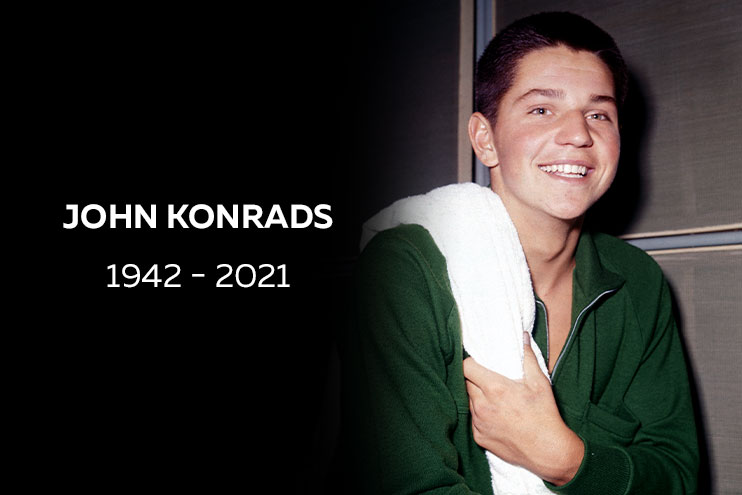
Commonwealth Games Australia mourns the passing of the three-time Commonwealth Games gold medallist, Olympic champion and Australian swimming icon, aged 78.
John Konrads along with his younger sister, Ilsa Konrads, rewrote the swimming world record books in the late 1950s and early 1960s, in an illustrious career where he set 26 individual freestyle world records between the 200m and 1500m distances.
John represented Australia at two Olympics and made one dominant appearance at the Commonwealth Games, winning three gold medals in the pool at the Cardiff 1958 Empire Games.
However winning gold medals for Australia in a pool in Wales, was a long way from where the champion swimmer’s story began.
Born in Riga, Latvia in 1942, Jānis (later changed to John), and Ilze (later changed to Ilsa) born in 1944, joined their parents and family in an emigration journey to Australia to escape the outbreak of War.
The duo’s parents Janis and Elza, their grandmother, and their sister Eve, initially sought refuge in Germany in August 1944, this came after Latvia’s occupation by German troops during the Second World War and then re-occupation by Soviet troops. Living in Germany until 1949, the family’s application to immigrate to the United States was refused on account of the large size of the family. Instead, Australia accepted them.
The Konrads relocated to a camp at Uranquinty, which was previously a base for the Royal Australian Air Force, in rural western New South Wales. There the Konrad patriarch Janis taught the children how to swim, fearing that they could drown in the many watering holes and dams in the camp. After spending four weeks in hospital due to a case of polio, John swam therapeutically to rebuild strength and his legend began.
After Janis secured work as a dentist in Sydney, the Konrads moved into the suburb of Bankstown in the city’s west and the children attended Revesby Primary School, where fortuitously one of the teachers was a young Don Talbot.
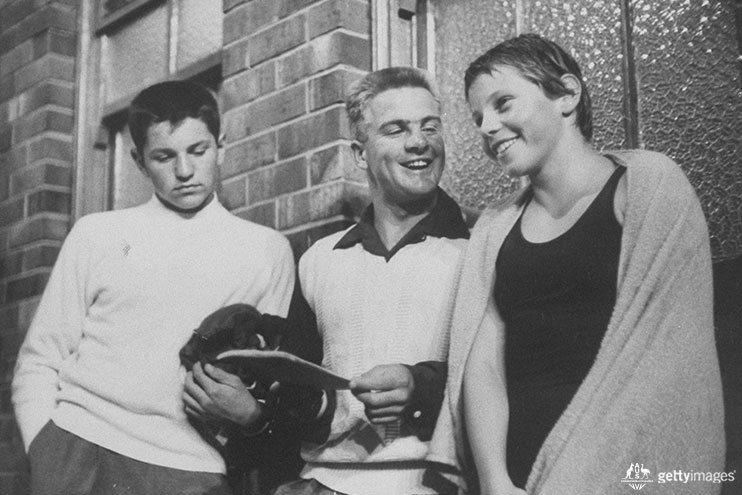
The Konrad Kids with legendary swimming coach Don Talbot. (CGA Archive / Getty Images)
Talbot, a future Australian swim coaching legend himself, invited the Konrads to join the Bankstown Swimming Pool club, where the siblings excelled as juniors. Training before and after school, John won his first national title in 1956, winning the junior 440-yard freestyle title, earning him a position as a reserve for the Melbourne 1956 Olympics team.
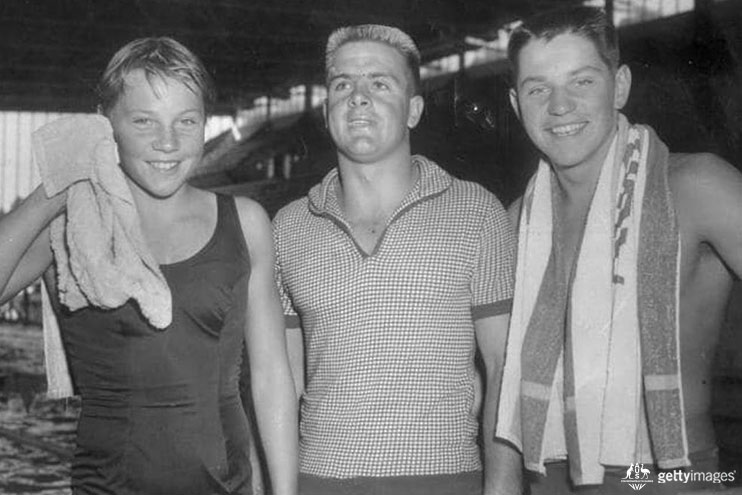
The Konrad Kids with legendary swimming coach Don Talbot. (CGA Archive / Getty Images)
In 1958, the results of his and Ilsa’s training began to materialise, when John won his first national titles and broke his first world records. In the space of eight days in January 1958, John set world records in the 200m, 220-yard, 400m, 440-yard, 800m and 800-yard events. Breaking another eight world records in February and March, including a 1500m and 1650-yard world record, and proceeded to win the 220-yard, 440-yard and 1650-yard freestyle titles at the 1958 Australian Championships.
Ilsa meanwhile was breaking world records and winning Australian Championships of her own, earning the duo the nickname – The Konrad Kids – as they both qualified for the 1958 Empire Games team.
At the Games in Cardiff, John won three gold medals, the 440-yard and 1650-yard freestyle events and then combined with John Devitt, Gary Chapman and Brian Wilkinson to claim the 4×220-yard freestyle relay title.
Ilsa won gold in the women’s 440-yard freestyle event, at just 14-years-old, defeating highly experienced teammates Dawn Fraser and Lorraine Crapp, who joined Konrads on the podium.
The pair created history by becoming Australia’s first siblings to win Commonwealth Games gold at the same Games.
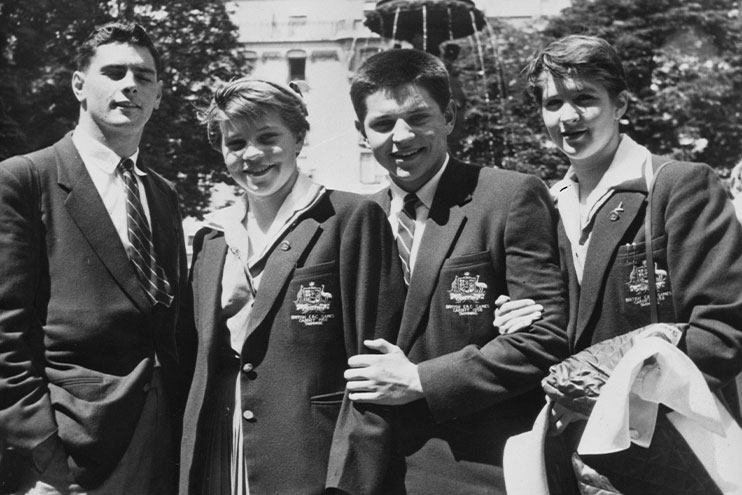
The Konrad Kids (centre) with Australian teammates John Devitt (left) and Dawn Fraser (right) at the Cardiff 1958 Empire Games.
John’s dominance of the pool continued throughout 1959 where he won every Australian freestyle title, before going on to represent Australia at the Rome 1960 Olympics. At the Games in Italy, John won gold in the 1500m, and bronze in the 400m behind teammate Murray Rose who claimed gold, before joining Devitt, Rose and David Dickson to win bronze in the 4×220-yard event.
Following the Games, John accepted a scholarship to study at the University of Southern California, returning to Australia to qualify for the Tokyo 1964 Olympics where he managed to make the 4x200m relay team. Following the Games, John Konrads retired from swimming and became a swimming coach, and embarked on a successful business career which saw him rise to the Australasian directorship of global personal care company L’Oréal.
Swimming Australia President and fellow Commonwealth Games and Olympic 1500m champion, Kieren Perkins OAM said Konrads dominated the Australian swimming scene during the ‘50s and ‘60s.
“Firstly, on behalf of Swimming Australia I’d like to send my condolences to John’s family, friends and loved ones – it’s a terribly sad time,” Perkins said.
“John’s story is quite amazing, it’s one of resilience and perseverance. To arrive in Australia as a young boy from Latvia who couldn’t swim, to then attend an Olympic Games as a 14-year-old only a few years later is remarkable.
“During his peak in the 1950s and ’60s John dominated the Australian swimming scene and achieved sensational feats in the distance freestyle events. The 1500m race obviously holds a very special place in my heart and I was lucky to have role models and mentors like John shine a light on this event for Australia – his feats helped cement it as
Commonwealth Games Australia CEO Craig Phillips said John Konrads made a significant contribution to Australian sport and provided an inspiration to the Commonwealth Sport movement.
“On behalf of Commonwealth Games Australia, I would like to share my condolences with the Konrads family and friends during this difficult time,” Phillips said.
“The Konrads story, both John’s and his sister Ilsa’s, is one that displays what hard work, determination and passion for sport can achieve.
“John’s performances in the pool and his journey have provided an inspiration to not only many fellow Australian athletes, but to many young athletes across the Commonwealth Sport movement… it is a testament to his legend.”
John Konrads was inducted into the Sports Australia Hall of Fame in 1985, a member of the International Swimming Hall of Fame, and one of the nine “Legends of Australian Swimming” at the Sydney International Aquatic Centre.
Commonwealth Games Australia joins Swimming Australia and the wider Australian sporting community in sending our condolences to John Konrads’ family and friends.
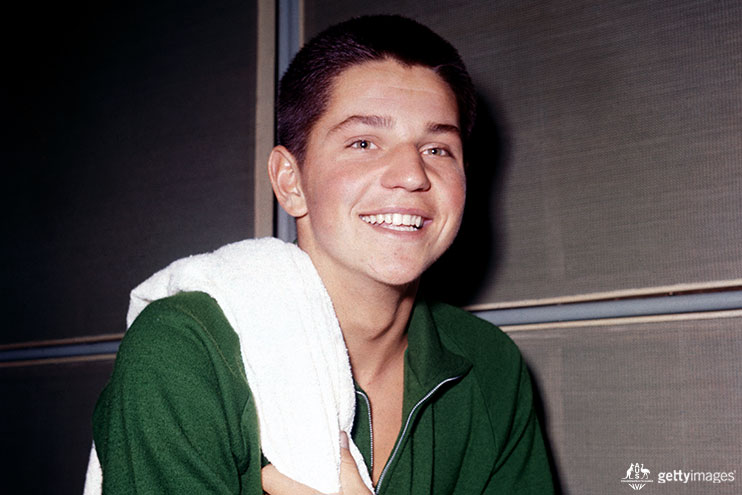
John Konrads after winning gold at the Cardiff 1958 Empire Games. (CGA Archive / Getty Images)
